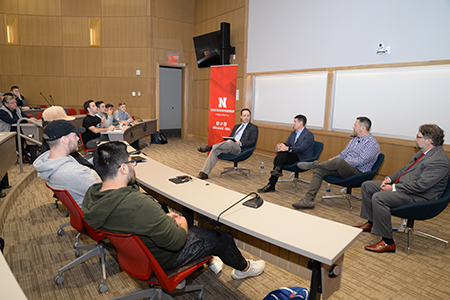Three Nebraska entrepreneurs took center stage at a special presentation at the University of Nebraska–Lincoln College of Business on January 26 in Howard L. Hawks Hall. The program, facilitated by Dr. Sam Nelson, director of the Center for Entrepreneurship, featured Jon McNeill, president of global sales and service at Tesla Motors; Joe Petsick `85, co-founder and CFO of Proxibid; and Matthew Wegener, founder and CEO of iSoft Data Systems, Inc. The three guests told their stories and emphasized to students the qualities it takes to make an impact as an entrepreneur.
“It started for me as a kid in Kearney, Nebraska,” said McNeill. “There was a new shoe on the market called Nike. My dad told me if I wanted a pair I’d have to figure out how to come up with the money, so I took two
Omaha World-Herald paper routes to get those shoes.”
The summer before his ninth grade McNeill, gained additional experience when the opportunity to run a landscaping company came to him from the school principal. At that time, McNeill did not own a driver’s license and was unsure how to pull it off.
“In a seminal, life-defining moment, the principal said, ‘You’ll figure it out.’ I had 90 customers with no way of getting to them, and I had to figure out how to hire people to drive me to places to work. That landscaping company grew and paid for my first car and college,” he said.
Those early businesses served as a launching point for McNeill, who refers to himself as a serial entrepreneur. Though interestingly, his current position at electric car manufacturer Tesla derived from being willing to take a chance with a company he did not create. Tesla, founded by business magnate Elon Musk, had already grown into a $4 billion company before McNeill came on board.
“Tesla was already a scaled company when I met Elon. Ultimately, what attracted me was working alongside the best practitioner of my craft. Elon created four companies in a row all worth over $10 billion – PayPal, SpaceX, Tesla and SolarCity. In addition, I work on a product at Tesla which directly impacts the world in a real interesting way. If you live within a kilometer of a freeway, your chances of dying from lung cancer are 66 percent higher because of auto emissions. I had just lost my dad to cancer at the time I met Elon,” said McNeill.
In a little over two years, Tesla grew to a $12 billion company with him on board. McNeill’s ability to thrive in a risk-taking role seemed to be a common thread among all the panelists.
 Dr. Sam Nelson facilitated the panel in front of students and members of the community.
Dr. Sam Nelson facilitated the panel in front of students and members of the community.
Petsick, a member of the Center for Entrepreneurship Advisory Board, found out early his job satisfaction tied closely to the entrepreneurial field.
“I worked at a forerunner to Ameritrade,” said Petsick. “They sent me to New York and I was put in a position where I was forced to solve problems. Later, when they grew larger I got put in a role that didn’t involve taking risk and I wasn’t very happy. I learned my energy came from that risk/reward component.”
Petsick eventually found his calling in the live auction industry. Although auction commerce accounts for a trillion dollars annually throughout the world, he discovered the marketplace was too fragmented. An opportunity existed to allow people from around the world to make transactions no matter their location. The early years of his startup were particularly difficult but Petsick found an ability to thrive in those moments.
“You learn to work your best when your back is pushed up against the wall. Innovation comes out in those situations. I experienced the fear of not meeting payroll several times early on. We didn’t miss a paycheck for any employee we hired but that meant I often didn’t get paid. It taught me you have to have real skin in the game,” he said.
Wegener, who received the center’s Distinguished Entrepreneur Award this past fall, made his entrepreneurial beginnings by placing ads in local papers to clean people’s Nintendo systems. He studied engineering at Nebraska and ultimately carved out a software business specializing in industrial computer technology process and data management for the vehicle recycling industry. In recent years, Wegener expanded his product base by introducing Presage Analytics which simplifies quality and compliance for food and beverage professionals. He talked about the critical nature of focus when tied to entrepreneurial success.
“In order to keep our entrepreneurial spirit we involve team members in decisions we’re going to make such as starting Presage,” said Wegener. “We continually ask ourselves to focus on what makes sense or what isn’t applicable to our core business. If we introduce a new product we need to understand how we are going to support two completely different products in two completely different marketplaces. When we decide on which product features to work on we ask ourselves what features will benefit both platforms and customers on both sides of our product lines. We were able to leverage Presage to strengthen our core.”
When panelists were asked to leave students with one piece of advice, their combined responses served as a blueprint for those interested in making their own entrepreneurial mark.
“Don’t be afraid,” said McNeill.
“What are you waiting for?” said Petsick.
“Find a problem and solve it,” said Wegener.
To learn more about the Center for Entrepreneurship, visit:
http://business.unl.edu/entrepreneurship
Published: February 2, 2018